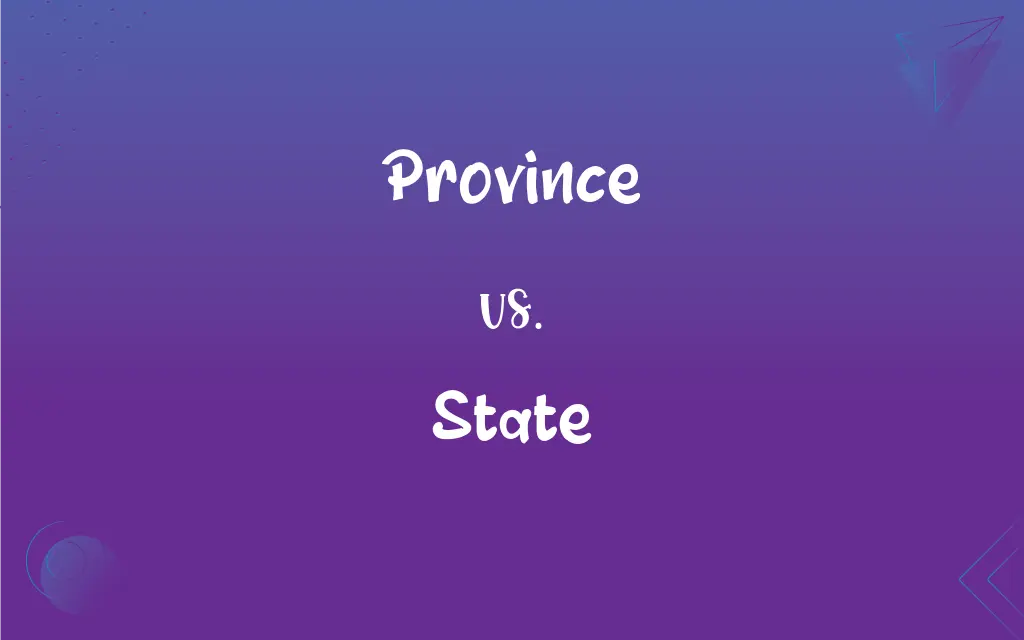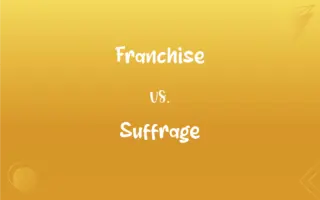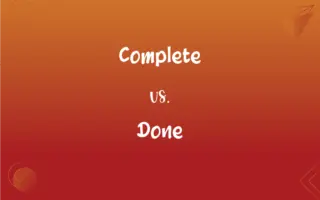Province vs. State: What's the Difference?
Edited by Aimie Carlson || By Janet White || Updated on October 7, 2023
A province is a territorial unit, often a division within a country, while a state can be an independent sovereign entity or a similar territorial and political unit within a federation.

Key Differences
A province and a state are both geopolitical entities, typically representing regions within a country. A province is often understood as a subdivision or a territorial unit within a country, particularly in countries with a parliamentary system. It has its own local government but is subordinate to the central government. A state, on the other hand, can represent a sovereign political entity that is subject to international law and can also be a primary territorial unit within a federal system, having its government with a degree of autonomy.
The concept of a province is usually found in countries like Canada and Italy, where the central government retains significant powers, and the provinces have authority over specific matters delegated to them. In contrast, the concept of a state is prevalent in countries like the United States and Australia, where states have considerable powers and operate under a federal system of governance. States have their constitution and can legislate on a wide range of matters, often having more autonomy compared to provinces.
When it comes to governance, a province usually has a governor or a premier appointed by the central government or elected by the provincial legislature, depending on the country's constitutional setup. In contrast, a state has its governor and can have a fully functioning government complete with an executive, legislative, and judicial branch, reflecting more sovereignty and self-governance compared to a province.
In terms of international relations and sovereignty, a province does not possess sovereignty and cannot conduct foreign relations or have its military. A state, particularly when referring to a sovereign state, has full sovereignty, can conduct foreign relations, have its military, and is a subject of international law. In federal systems, while individual states do not conduct foreign relations independently, they still retain a level of sovereignty and have more autonomy compared to provinces.
Comparison Chart
Definition
A territorial unit within a country.
A sovereign entity or a territorial unit within a federation.
ADVERTISEMENT
Level of Autonomy
Typically has less autonomy than a state.
Has more autonomy, particularly in federal systems.
Governance
Governed by a local government subordinate to the central government.
Has its government, often with a high degree of autonomy.
Sovereignty
Does not possess sovereignty.
Possesses sovereignty (in the case of sovereign states).
Presence of Constitution
Rarely has its constitution.
Often has its constitution (in federal systems).
Province and State Definitions
Province
A region marked by cultural or governmental distinction.
The province of Punjab is known for its vibrant culture.
ADVERTISEMENT
State
A nation or territory considered as an organized political community under one government.
The United States is composed of 50 individual states.
Province
A country or region brought under the control of ancient Rome.
Sicily was one of Rome's earliest provinces.
State
A condition or way of being that exists at a particular time.
The building is in a state of disrepair.
Province
A sphere of activity or domain.
Solving this issue is within the province of the legal department.
State
A sovereign political entity.
Each state has its representatives in the United Nations.
Province
A territorial unit within a country.
Quebec is a province in Canada.
State
One of the territories constituting a nation.
California is a state known for its diverse landscapes.
Province
An administrative district or division.
The province has its governance structures to manage local affairs.
State
To express something definitely or clearly in speech or writing.
The objectives should be stated clearly.
Province
A territory governed as an administrative or political unit of a country or empire.
State
A condition or mode of being, as with regard to circumstances
The office was in a state of confusion.
Province
(Ecclesiastical) A division of territory under the jurisdiction of a metropolitan.
State
A condition of being in a stage or form, as of structure, growth, or development
The fetal state.
Province
Provinces Areas of a country situated away from the capital or population center.
State
A mental or emotional condition
In a manic state.
Province
An area of knowledge, activity, or interest
A topic falling within the province of ancient history.
State
(Informal) A condition of excitement or distress
Was in a state over going to the prom.
Province
The range of one's proper duties and functions; scope.
State
Social position or rank.
Province
(Ecology) An area of land, less extensive than a region, having a characteristic plant and animal population.
State
(Physics) The condition of a physical system with regard to phase, form, composition, or structure
Ice is the solid state of water.
Province
Any of various lands outside Italy conquered by the Romans and administered by them as self-contained units.
State
Ceremony; pomp
Foreign leaders dining in state at the White House.
Province
A region of the earth or of a continent; a district or country.
State
The supreme public power within a sovereign political entity
The state intervening in the economy.
Province
An administrative subdivision of certain countries, including Canada and China.
State
The sphere of supreme civil power within a given polity
Matters of state.
Province
(Roman history) An area outside Italy which is administered by a Roman governor.
State
A specific kind of government
The socialist state.
Province
(Christianity) An area under the jurisdiction of an archbishop, typically comprising a number of adjacent dioceses.
State
A body politic, especially one constituting a nation
The states of Eastern Europe.
Province
(Roman Catholicism) An area under the jurisdiction of a provincial within a monastic order.
State
One of the more or less internally autonomous territorial and political units composing a federation under a sovereign government
The 48 contiguous states of the Union.
Province
The parts of a country outside its capital city.
State
Of or relating to a body politic or to an internally autonomous territorial or political unit constituting a federation under one government
A monarch dealing with state matters.
The department that handles state security.
Province
An area of activity, responsibility or knowledge; the proper concern of a particular person or concept.
State
Owned and operated by a state
State universities.
Province
A country or region, more or less remote from the city of Rome, brought under the Roman government; a conquered country beyond the limits of Italy.
State
To set forth in words; declare.
Province
A country or region dependent on a distant authority; a portion of an empire or state, esp. one remote from the capital.
State
A condition; a set of circumstances applying at any given time.
A state of being
A state of emergency
Province
A region of country; a tract; a district.
Over many a tractof heaven they marched, and many a province wide.
Other provinces of the intellectual world.
State
(physics) A complete description of a system, consisting of parameters that determine all properties of the system.
Province
A region under the supervision or direction of any special person; the district or division of a country, especially an ecclesiastical division, over which one has jurisdiction; as, the province of Canterbury, or that in which the archbishop of Canterbury exercises ecclesiastical authority.
State
A mess; disorder.
Absolute state
In a state
Province
The proper or appropriate business or duty of a person or body; office; charge; jurisdiction; sphere.
The woman'sprovince is to be careful in her economy, and chaste in her affection.
State
(computing) The stable condition of a processor during a particular clock cycle.
In the fetch state, the address of the next instruction is placed on the address bus.
Province
Specif.: Any political division of the Dominion of Canada, having a governor, a local legislature, and representation in the Dominion parliament. Hence, colloquially, The Provinces, the Dominion of Canada.
State
(computing) The set of all parameters relevant to a computation.
The state here includes a set containing all names seen so far.
Province
The territory occupied by one of the constituent administrative districts of a nation;
His state is in the deep south
State
(computing) The values of all parameters at some point in a computation.
A debugger can show the state of a program at any breakpoint.
Province
The proper sphere or extent of your activities;
It was his province to take care of himself
State
(sciences) The physical property of matter as solid, liquid, gas or plasma.
State
(obsolete) Highest and stationary condition, as that of maturity between growth and decline, or as that of crisis between the increase and the abating of a disease; height; acme.
State
High social standing or circumstance.
State
Pomp, ceremony, or dignity.
In state
The President's body will lie in state at the Capitol.
State
Rank; condition; quality.
State
Condition of prosperity or grandeur; wealthy or prosperous circumstances; social importance.
State
A chair with a canopy above it, often standing on a dais; a seat of dignity; also, the canopy itself.
State
(obsolete) A great person, a dignitary; a lord or prince.
State
(obsolete) Estate, possession.
State
A polity.
State
Any sovereign polity; a national or city-state government.
State
A political division of a federation retaining a notable degree of autonomy, as in the United States, Mexico, Nigeria, or India.
State
(obsolete) A form of government other than a monarchy.
State
(anthropology) A society larger than a tribe. A society large enough to form a state in the sense of a government.
State
An element of the range of the random variables that define a random process.
State
The lexical aspect (aktionsart) of verbs or predicates that do not change over time.
State
(transitive) To declare to be a fact.
He stated that he was willing to help.
State
(transitive) To make known.
State your intentions.
State
(obsolete) Stately.
State
The circumstances or condition of a being or thing at any given time.
State is a term nearly synonymous with "mode," but of a meaning more extensive, and is not exclusively limited to the mutable and contingent.
Declare the past and present state of things.
Keep the state of the question in your eye.
State
Rank; condition; quality; as, the state of honor.
Thy honor, state, and seat is due to me.
State
Condition of prosperity or grandeur; wealthy or prosperous circumstances; social importance.
She instructed him how he should keep state, and yet with a modest sense of his misfortunes.
Can this imperious lord forget to reign,Quit all his state, descend, and serve again?
State
Appearance of grandeur or dignity; pomp.
Where least of state there most of love is shown.
State
A chair with a canopy above it, often standing on a dais; a seat of dignity; also, the canopy itself.
His high throne, . . . under stateOf richest texture spread.
When he went to court, he used to kick away the state, and sit down by his prince cheek by jowl.
State
Estate; possession.
Your state, my lord, again is yours.
State
A person of high rank.
State
The principal persons in a government.
The bold designPleased highly those infernal states.
State
The bodies that constitute the legislature of a country; as, the States-general of Holland.
State
A form of government which is not monarchial, as a republic.
Well monarchies may own religion's name,But states are atheists in their very fame.
State
A political body, or body politic; the whole body of people who are united under one government, whatever may be the form of the government; a nation.
Municipal law is a rule of conduct prescribed by the supreme power in a state.
The Puritans in the reign of Mary, driven from their homes, sought an asylum in Geneva, where they found a state without a king, and a church without a bishop.
State
In the United States, one of the commonwealths, or bodies politic, the people of which make up the body of the nation, and which, under the national constitution, stand in certain specified relations with the national government, and are invested, as commonwealths, with full power in their several spheres over all matters not expressly inhibited.
State
Highest and stationary condition, as that of maturity between growth and decline, or as that of crisis between the increase and the abating of a disease; height; acme.
I do not, brother,Infer as if I thought my sister's stateSecure without all doubt or controversy.
We hoped to enjoy with ease what, in our situation, might be called the luxuries of life.
And, O, what man's condition can be worseThan his whom plenty starves and blessings curse?
State
A statement; also, a document containing a statement.
State
Stately.
State
Belonging to the state, or body politic; public.
State
To set; to settle; to establish.
I myself, though meanest stated,And in court now almost hated.
Who calls the council, states the certain day.
State
To express the particulars of; to set down in detail or in gross; to represent fully in words; to narrate; to recite; as, to state the facts of a case, one's opinion, etc.
State
The group of people comprising the government of a sovereign state;
The state has lowered its income tax
State
The territory occupied by one of the constituent administrative districts of a nation;
His state is in the deep south
State
A politically organized body of people under a single government;
The state has elected a new president
African nations
Students who had come to the nation's capitol
The country's largest manufacturer
An industrialized land
State
The way something is with respect to its main attributes;
The current state of knowledge
His state of health
In a weak financial state
State
The federal department in the UnitedStates that sets and maintains foreign policies;
The Department of State was created in 1789
State
The territory occupied by a nation;
He returned to the land of his birth
He visited several European countries
State
A state of depression or agitation;
He was in such a state you just couldn't reason with him
State
(chemistry) the three traditional states of matter are solids (fixed shape and volume) and liquids (fixed volume and shaped by the container) and gases (filling the container);
The solid state of water is called ice
State
Express in words;
He said that he wanted to marry her
Tell me what is bothering you
State your opinion
State your name
State
Put before;
I submit to you that the accused is guilty
State
Indicate through a symbol, formula, etc.;
Can you express this distance in kilometers?
FAQs
Is a province generally subordinate to a central government?
Yes, a province is typically subordinate to a central government.
Do both province and state represent territorial units within a country?
Yes, both province and state can represent territorial units within a country.
Can provinces conduct foreign relations independently?
No, provinces do not have sovereignty and cannot conduct independent foreign relations.
Is the concept of a province common in parliamentary systems?
Yes, the concept of a province is often found in countries with parliamentary systems.
Do provinces usually have less legislative power than states?
Yes, provinces typically have less legislative power compared to states.
Can a province be a region with cultural distinction?
Yes, a province can be a region marked by cultural or governmental distinction.
Can a state be a sovereign entity?
Yes, a state can be a sovereign political entity.
Do states in a federal system have significant legislative powers?
Yes, states in a federal system often have significant legislative powers.
Is a state often more autonomous than a province?
Yes, in federal systems, a state usually has more autonomy compared to a province.
Do states in a federation have their constitution?
Yes, states within a federal system often have their constitution.
Does a state have its government?
Yes, a state has its own government with a degree of autonomy.
Can the word state also refer to a condition or way of being?
Yes, the word state can also denote a condition or way of being.
Are provinces present in countries like Canada and Italy?
Yes, provinces are territorial units in countries like Canada and Italy.
About Author
Written by
Janet WhiteJanet White has been an esteemed writer and blogger for Difference Wiki. Holding a Master's degree in Science and Medical Journalism from the prestigious Boston University, she has consistently demonstrated her expertise and passion for her field. When she's not immersed in her work, Janet relishes her time exercising, delving into a good book, and cherishing moments with friends and family.
Edited by
Aimie CarlsonAimie Carlson, holding a master's degree in English literature, is a fervent English language enthusiast. She lends her writing talents to Difference Wiki, a prominent website that specializes in comparisons, offering readers insightful analyses that both captivate and inform.































































